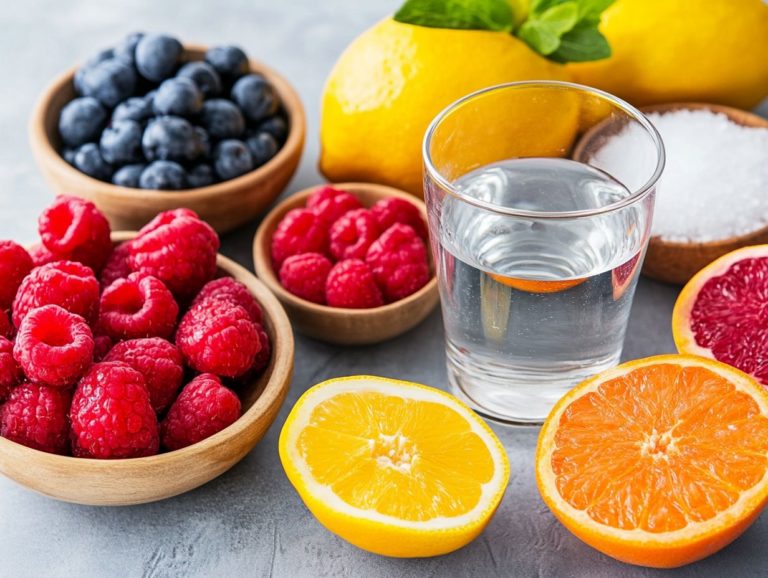The Role of Vitamin A in Eye Health
Vitamin A is your eye’s best friend! It is essential for maintaining optimal eye health, influencing everything from the clarity of your vision to the prevention of various eye diseases.
This article delves into the numerous benefits of Vitamin A, showcasing its role in enhancing vision and reducing issues such as night blindness. We ll also cover signs of deficiency, highlight natural food sources and supplements, provide recommended intake guidelines, and discuss potential risks linked to supplementation.
Explore how this vital nutrient can safeguard your eyes and contribute to your overall well-being. Don t wait ensure you get enough Vitamin A to protect your vision today!
Contents
Key Takeaways:

Vitamin A is crucial for maintaining good eye health, as it helps improve vision and reduce the risk of eye diseases. Signs of Vitamin A deficiency in the eyes include night blindness, dry eyes, and an increased risk of eye infections.
Natural food sources such as carrots, spinach, and sweet potatoes, along with Vitamin A supplements, can help meet the recommended intake for good eye health.
What is Vitamin A and Why is it Important for Eye Health?
Vitamin A is an important nutrient that dissolves in fat and plays a crucial role in maintaining eye health. It significantly influences vision, immune function, reproductive health, and cellular communication.
You ll find it in two forms: retinol and retinoic acid, which come from animal products like liver and plant sources rich in beta-carotene, such as sweet potatoes and leafy greens. Understanding its multifaceted benefits helps prevent health issues linked to deficiency, such as macular degeneration and other eye-related symptoms.
This essential nutrient is vital for the formation of rhodopsin, a pigment in your retina crucial for low-light vision. Vitamin A also boosts your immune system by facilitating the development of T-cells, key players in fighting infections. It also supports reproductive health by regulating gene expression related to sperm development and ovulation.
By ensuring you maintain adequate levels of Vitamin A, you can potentially fend off diseases like respiratory infections and certain cancers, highlighting its profound impact on your overall well-being.
Benefits of Vitamin A for Eye Health
Vitamin A provides a wealth of benefits for your eye health. It enhances vision, offers protection against age-related macular degeneration, and boosts immune function.
This makes it an essential nutrient for maintaining overall ocular wellness.
Improved Vision and Reduced Risk of Eye Diseases
Consuming adequate amounts of Vitamin A can significantly enhance your vision and lower the risk of various eye diseases, including age-related macular degeneration. This nutrient supports the health of your retinal cells and overall ocular function.
Vitamin A plays a vital role in producing rhodopsin, a pigment in the retina that helps your eyes adapt to low-light conditions. Its antioxidant properties are essential for combating oxidative stress, which can harm the delicate structures of your eyes and contribute to issues like cataracts and dry eye syndrome.
By maintaining the integrity of your corneal surface and reducing inflammation, Vitamin A also serves as a defense against infections that could jeopardize your vision. Regularly incorporating sources such as carrots, sweet potatoes, and leafy greens into your diet is a proactive way to safeguard your eye health throughout your life.
Signs of Vitamin A Deficiency in the Eyes

Vitamin A deficiency can lead to a range of eye-related symptoms and health issues that profoundly compromise your eye health, including night blindness and xerophthalmia.
This underscores the critical importance of maintaining an adequate intake of this essential nutrient.
Identifying Symptoms and Associated Conditions
Common symptoms of Vitamin A deficiency include night blindness and dry eyes. Recognizing these symptoms is crucial, as failing to address them can lead to severe ocular issues.
Beyond visual impairments, you may experience skin problems, immune dysfunction, and a heightened vulnerability to infections. A worsening deficiency can lead to xerophthalmia, a serious condition that may cause corneal ulcers and even blindness.
The severity of these symptoms can significantly affect your quality of life, making everyday tasks challenging and diminishing your enjoyment of activities dependent on good vision, such as reading or driving.
Ensuring adequate Vitamin A intake is vital for maintaining good eye health and supporting essential bodily functions that contribute to your overall well-being.
Sources of Vitamin A
You can get Vitamin A from animal products like liver and dairy, as well as plant-based foods such as sweet potatoes and carrots. For those with dietary restrictions, supplements are available to help you meet your nutritional needs.
Natural Food Sources and Supplements
Natural food sources of Vitamin A are abundant, including animal products like liver and dairy and plant-based options rich in beta-carotene, such as sweet potatoes and spinach. Supplements also play a crucial role in helping you meet your daily requirements.
The nutritional value of these foods is impressive, as they not only provide Vitamin A but also a wealth of essential vitamins and minerals. Sweet potatoes are versatile culinary stars and loaded with fiber, promoting digestive health. Leafy greens like spinach are packed with antioxidants, contributing to your overall wellness.
For those with dietary restrictions, such as vegans or vegetarians, various supplements like beta-carotene capsules can serve as a practical alternative. Typically, a dosage of 15 to 25 mg per day is recommended to ensure you get enough, especially when natural sources are limited.
This way, you can easily meet your needs and enjoy the benefits of Vitamin A without compromise.
Recommended Intake of Vitamin A for Eye Health

The recommended intake of Vitamin A varies by age and gender, highlighting the necessity for personalized dietary guidelines. Meeting these needs is key for eye health and preventing deficiencies throughout various life stages.
Age and Gender-Specific Guidelines
Your age and gender determine how much Vitamin A you need. For infants aged 0-6 months, the requirement is about 400 micrograms (mcg) of Retinol Activity Equivalents (RAE) per day. Toddlers aged 1-3 years need around 300 mcg.
As children grow, those aged 4-8 years should receive approximately 400 mcg, while older boys and girls aged 9-13 should get about 600 mcg and 500 mcg, respectively.
In adults, the recommended intake increases to 900 mcg for men and 700 mcg for women. Pregnant women require about 770 mcg to support fetal development.
These tailored guidelines are designed to prevent deficiency-related ocular symptoms like dry eyes and night blindness, while also maintaining overall eye health and averting future complications.
Precautions and Side Effects of Vitamin A Supplementation
While Vitamin A is vital, be careful not to overdo it. Excessive intake can lead to vitamin A toxicity and chronic hypervitaminosis, which are serious conditions to watch out for.
Understanding Potential Risks and Interactions
Understanding the potential risks linked to Vitamin A supplementation is key to preventing negative effects. It also helps you maintain a safe intake level for your eye health.
Excessive intake can lead to toxicity. Recognize that high doses of Vitamin A may disrupt the effectiveness of Vitamin C, zinc, and omega-3 fatty acids all crucial for your overall health.
Pay close attention to your multivitamin combinations and dietary sources. Balancing these nutrients can be complex.
Consulting with a healthcare professional is a wise step. They can help you identify safe dosage levels and determine if supplementation is truly necessary.
Regular blood tests can help mitigate risks. This ensures your Vitamin A levels remain within a safe range.
Frequently Asked Questions

What is the role of Vitamin A in eye health?
Vitamin A is vital for maintaining good eye health. It helps prevent age-related macular degeneration, cataracts, and night blindness.
How does Vitamin A benefit the eyes?
Vitamin A is necessary for producing rhodopsin. This pigment helps your eyes adjust to changes in light and promotes clear vision.
What foods are high in Vitamin A?
Foods rich in Vitamin A include carrots, sweet potatoes, spinach, kale, eggs, and liver.
Can Vitamin A deficiency cause eye problems?
Yes, a Vitamin A deficiency can lead to various eye problems. These include dry eyes and night blindness, and severe cases can result in blindness.
Is it possible to get too much Vitamin A in your diet?
Yes, overconsumption of Vitamin A can cause nausea, headaches, and even liver damage. Follow the recommended daily intake guidelines to stay safe.
Can Vitamin A supplements help improve eye health?
Yes, these supplements can benefit those with a Vitamin A deficiency or at risk for certain eye conditions. Always consult a healthcare professional before adding new supplements to your diet.






